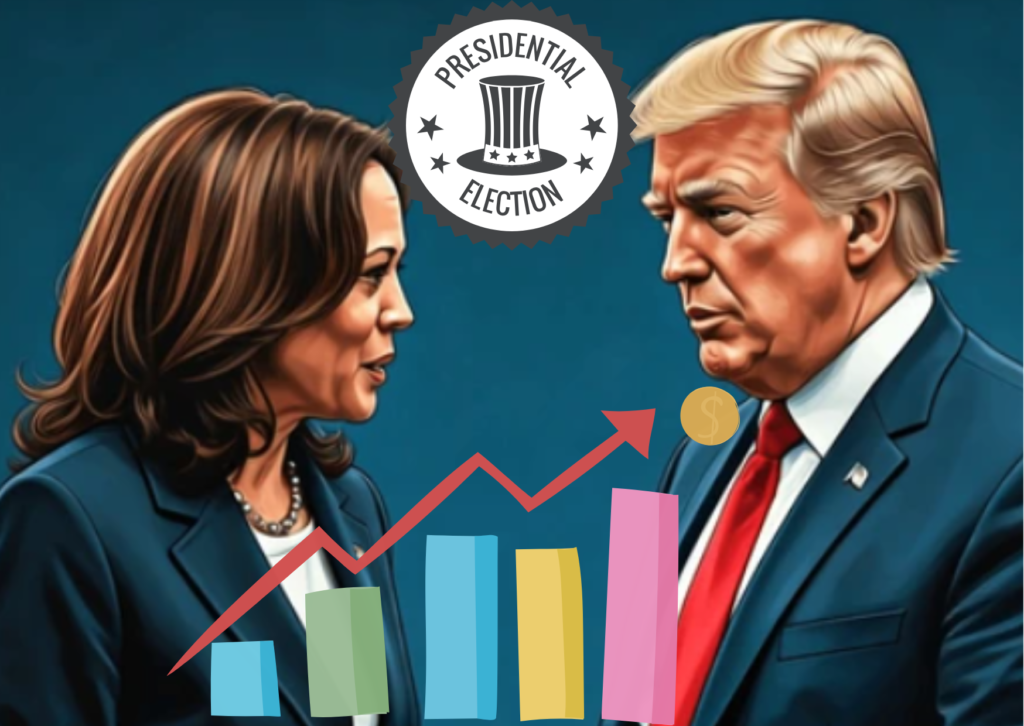
The US presidential election in 2024 is drawing global attention, not only within America but also worldwide, including in India. As one of the largest and most diverse democracies, India closely follows US politics, especially when it comes to the economy. The US and India share strong trade and investment ties, which means that changes in the US government can impact Indian markets. This blog will explore what’s at stake in the 2024 US presidential election and how it might impact India’s economy and stock markets.US Presidential Electin 2024: What’s at Stake?
Key Election Issues in the US
The main issues driving this election include:
- Economic Policy: High inflation, interest rates, and national debt are major economic concerns. Candidates may propose policies on tax reform, government spending, and energy production.
- Foreign Policy: How the US interacts with other nations, including China and Russia, will be a critical point. Trade relations with allies, including India, will also be affected by these policies.
- Climate and Energy Policies: Energy independence, clean energy policies, and climate change action are important issues in the US, especially as they relate to economic growth and environmental impact.
- Technology and Innovation: Technology is a major growth area for the US, including AI and cybersecurity, and candidates may focus on policies that foster or regulate tech industries. These policies can influence Indian tech companies that do business with the US.
Why the US Election Matters to India
The US and India are strategic partners in trade, technology, and geopolitics. Here’s why the election matters to India:
- Trade Relations: India and the US have a strong trade relationship, with the US being one of India’s largest trading partners. Policies that promote trade liberalization can benefit Indian exports, while protectionist policies may hinder it.
- Investment Flows: The US is a major source of foreign direct investment (FDI) into India. American companies invest in sectors like technology, infrastructure, and renewable energy. Changes in US corporate tax rates or regulations may impact these investments.
- Technology Industry: India’s tech industry, which includes companies like Infosys, TCS, and Wipro, relies heavily on the US for business. Policies that impact outsourcing, H1-B visas, and data privacy could directly affect these companies.
- Geopolitical Stability: India relies on the US for security cooperation, especially in areas like defense and counter-terrorism. The US’s stance on countries like China and Russia can also affect India’s regional security and economic environment.
Impact on the Indian Stock Market
The election outcome could have short- and long-term effects on the Indian stock market. Here’s how:
- Short-Term Volatility: Leading up to the election, markets often experience volatility due to uncertainty. Investors may be cautious, especially in sectors like technology and pharma, which have significant exposure to the US.
- Rupee and Dollar Exchange Rates: A strong US dollar could impact the Indian rupee’s value, affecting import costs and inflation in India. If the Federal Reserve under the new administration decides to keep interest rates high, the rupee might weaken against the dollar.
- Long-Term Growth Sectors: Certain sectors like defense, tech, and renewable energy could see a boost if the US election outcome favors partnerships with India. Indian companies in these sectors may benefit from new opportunities and investments.
Conclusion
The 2024 US presidential election will impact India economically and geopolitically. The extent of the impact will depend on who wins and what policies they prioritize. As the election draws closer, Indian businesses and investors will closely watch the candidates’ positions on trade, investment, immigration, and global alliances. Whether the next president pursues a “Buy American” agenda or strengthens global partnerships, India will remain a significant partner for the US. However, Indian markets may experience volatility in the short term as they wait for the final outcome and adjust to new policies.
As Indian investors and businesses stay tuned to US election developments, it’s important to prepare for potential shifts in trade relations, currency exchange rates, and market sentiment. By understanding these dynamics, India can be well-prepared to benefit from new opportunities and manage risks arising from the 2024 US presidential election.
Frequently Asked Questions (FAQs)
1. How could the 2024 US presidential election impact India’s technology sector?
The Indian technology sector is closely tied to the US through outsourcing, investments, and the employment of skilled Indian workers in American companies. If the election results in policies that restrict outsourcing or make H1-B visas harder to obtain, Indian IT companies could be negatively affected. On the other hand, if the new administration prioritizes tech and innovation partnerships, it may lead to more collaboration, investment, and growth in sectors like AI, cybersecurity, and renewable tech in India.
2. Will a change in the US presidency impact the Indian stock market?
Yes, the Indian stock market may see short-term volatility around the election due to uncertainty. The stock prices of sectors with significant US exposure, like IT and pharmaceuticals, might fluctuate. Additionally, policies around US interest rates can affect the rupee-dollar exchange rate, impacting Indian imports and inflation. Long-term impacts will depend on the winning candidate’s approach to US-India relations, especially in trade, defense, and technology sectors.
3. Could US foreign policy changes after the election impact Indian trade?
Absolutely. If the new president enacts trade policies that increase tariffs or restrict imports, Indian exports to the US could be affected, especially in goods like textiles and metals. Alternatively, policies that promote free trade or strengthen alliances in the Indo-Pacific region could positively impact Indian exports. Stability in trade relations will benefit both countries, particularly as the US may seek alternatives to Chinese imports, which could open up more opportunities for Indian businesses.

